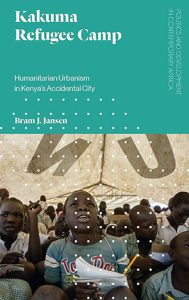Kakuma Refugee Camp: Humanitarian Urbanism in Kenya’s Accidental City

Author: Bram J. Jansen
Publisher: Zed Books
Year of Publication: 2019
Print Length: 248 pages
Genre: Non-Fiction / Political Science, Social Science, Development Studies, Migration & Refugee Studies
Area: Kakuma Refugee Camp, Kenya
Topic: Refugees & Forced Migration, Asylum & Asylum Seekers, Asylum & Refugee System, Refugee Urban Settlement, Protracted Refugee Situations, Humanitarian Urbanism, Humanitarian Action & Humanitarianism, Aid, Camps, City & Urban, Development, Governance, Management, Everyday Life, Refugee Economies, Movement of People and Ideas, Culture & Society, Lived Experience, Testimonies, Global South, Identity, Transit
Kenya’s Kakuma refugee camp is one of the world’s largest, home to over 100,000 people drawn from across east and central Africa. Though notionally still a ‘temporary’ camp, it has become a permanent urban space in all but name with businesses, schools, a hospital and its own court system. Such places, Bram J. Jansen argues, should be recognised as ‘accidental cities’, a unique form of urbanization that has so far been overlooked by scholars.
Based on extensive ethnographic fieldwork, Jansen’s book explores the dynamics of everyday life in such accidental cities. The result is a holistic socio-economic picture, moving beyond the conventional view of such spaces as transitory and desolate to demonstrate how their inhabitants can develop a permanent society and a distinctive identity. Crucially, the book offers important insights into one of the greatest challenges facing humanitarian and international development workers: how we might develop more effective strategies for managing refugee camps in the global South and beyond.
An original take on African urbanism, Kakuma Refugee Camp will appeal to practitioners and academics across the social sciences interested in social and economic issues increasingly at the heart of contemporary development.
Table of Contents
Acknowledgements
Introduction
1. Humanitarian Urbanism
2. The Entitlement Arena Intermission: Walking the Camp
Intermission: Walking the Camp
3. The Camp as Warscape
4. ‘Digging’ Aid: The Development of a Refugee Camp Economy
5. Moving Along: The Camp as Portal
6. There’s No Way Back to the Village
Conclusion
Resources
Notes
Index

Bram J. Jansen is an anthropologist with the Sociology of Development and Change group (SDC) at Wageningen University. His teaching and research focuses on refugee and humanitarian studies. He is interested in humanitarian contexts and crises that become protracted, and in which aid transforms from immediate and short term intervention into a form of humanitarian governance over people and places, and its effects. Specific areas of interests are protracted crises and refugee movements in East and the Horn of Africa, the Middle East and increasingly Europe.
Source: https://www.kuno-platform.nl/professionals/bram-j-jansen/
More from Bram J. Jansen in this library, click here.
